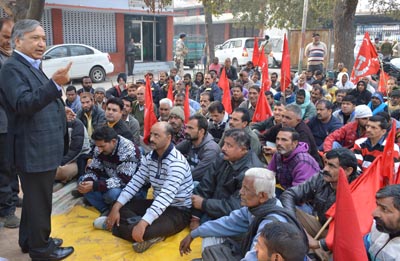Excelsior Correspondent
Jammu, Dec 22: As a part of country-wide protest demonstrations, the workers engaged in casual, contract, ad-hoc, temporary daily wage jobs employed in different sectors across the state organized a protest demonstration under the banner of CITU at Press Club Jammu demanding implementation of Judgment of Supreme Court on “equal pay for equal work”. A large number of workers participated in the massive demonstration holding red flags, banners and placards in their hands and shouting slogans for implementation of the judgment forthwith.
While addressing the workers, State President J&K CITU, M.Y Tarigami said that the issue of denial of same wages for same and similar jobs was being raised for long by the trade unions. Despite having a law of Equal Remuneration Act, there are huge disparities in the wages and other benefits of regular workers and casual, daily-rated and contract workers doing the same work he added. The issue was raised again and again by the trade unions with different Governments at the Centre but the successive Government have not done anything in this behalf and this was one of the demands on which the trade unions in the country have been launching consistent struggles and organizing country wide general strikes. He demanded that at least now, with the Supreme Court directing that the principle of equal pay for equal work
constitutes a clear and unambiguous right vested in every worker, the State Governments should ensure this principle and also demanded that there should be no further delay in ensuring implementation of this judgment.
Om Parkash, general secretary in his address said that in para 55 of the judgement the court said, “an employee engaged for the same work cannot be paid less than another who performs the same duties and responsibilities. Certainly not in a welfare state. Such an action besides being demeaning, strikes at the very foundation of human dignity. Any one who is compelled to work at a lesser wage, does not do so voluntarily. He does so, to provide food and shelter to his family, at the cost of his self respect and dignity, at the cost of his self worth, and at the cost of his integrity. For he knows, that his dependents would suffer immensely, if he does not accept the lesser wage. Any act of paying less wages, as compared to others similar situate, constitute an act of exploitative enslavement, emerging out of a domineering position. Undoubtedly, the action is oppressive, suppressive and coercive, as it compels involuntary subjugation”, he added.
Sham Parsad Kesar, senior leader CITU said that more than 50 judgements of the Supreme Court, right from the year 1967 upto 2014 on the subject, have been analysed in detail before arriving at the above conclusion and it is applicable to every worker, even a single worker so engaged in a job of casual, contract, ad-hoc, temporary, badly (cnyh), daily wages, workcharge, provisional and the like nature no matter what the nomenclature is entitled to get equal pay at par with the regular employee engaged in the equal work in employment under all central/state Govt. departments, public and private sector companies and establishments.


